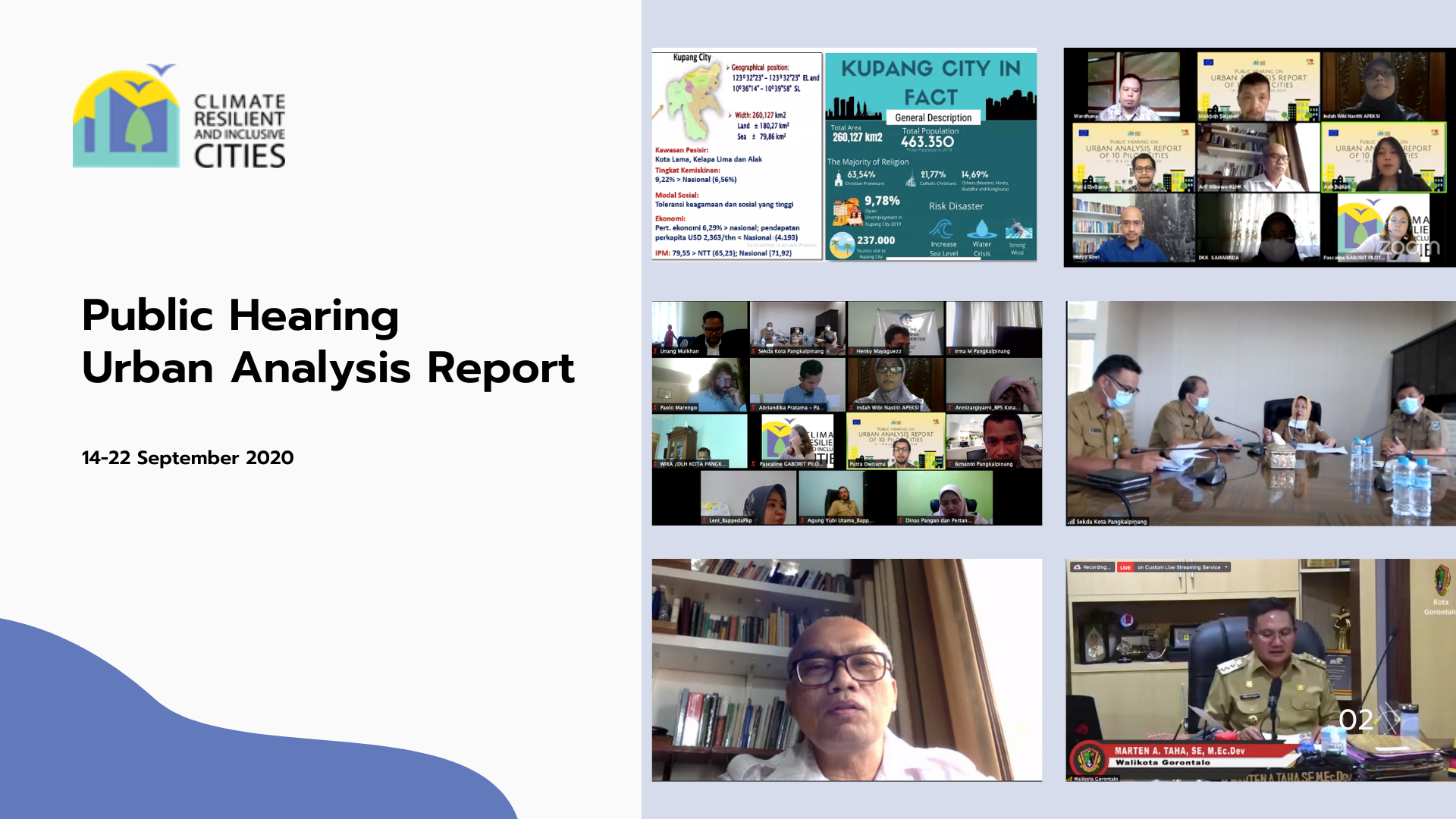CRIC Project successfully held a week of virtual public hearing meetings on Urban Analysis Report from September 14 to 22, with 280 people in attendance. The meetings have been met with a positive response from the diverse participants expecting that the Urban Analysis Report can provide practical recommendations for cities to develop climate-proof development policies and plans.

The Urban Analysis Report is a 3-month study of ten CRIC’s pilot cities carried out by a panel of urban experts. The study seeks to identify characteristics of each city and climate-related existing policies and policy gaps while providing recommendations to pilot cities. Participants of the meetings include the representatives of Indonesian Ministry of Environment & Forestry (MoEF), APEKSI (the Association of the Indonesian Municipalities), pilot cities and European Union Delegate.
Each day, experts would present report findings and recommendation. Then, representatives from city governments, MoEF, AIM, universities and civil society organisations had an opportunity to give their feedback. Feedback from the participants would be utilised to improve the Urban Analysis Report. Six urban experts were involved in these meetings: M. Ridwan is the lead researcher for Kupang, Wahyu Mulyana for Mataram and Pekanbaru; Harya Dillon for Gorontalo and Ternate; Mulya Amri for Banjarmasin and Samarinda; Hari Priyadi for Bandar Lampung and Cirebon; Unang Mulkhan for Pangkal Pinang.
The report findings show that climate-related risks vary from city to city, and by not addressing these properly, city will put its strategic sectors and communities at stake. As an example, M. Ridwan presented that Kupang is susceptible to sea-level rise and drought and the impact will worsen due to climate change, causing disruption to water and sanitation, food system, public health and local economies. Experts also presented climate-change related existing programme and policies, such as the Indonesia Government’s Climate Village Programme (Proklim), developed to build climate resilience from a village level. Such program can be utilised and leveraged further by cities and CRIC Project to obtain greater impact.
However, the report has not fully provided information about the effectiveness of current policies and the potential of new policies. Such policy gaps analysis will be required to give insights to cities on relevant climate-related policies that they need to execute. Another feedback is related to recommendation. Cirebon’s Head of Development and Planning Agency Iing Daiman said that city governments seek more “practical and grounded” recommendations to tackle the city’s pressing issue such as waste management.
The importance of data validity and accuracy was also highlighted during the discussion. Representative from Pangkal Pinang, Ikmanto argued that the city has conducted its GHG inventory in 2010, yet the report stated otherwise. Meanwhile, Indah Wibi Nastiti, the Chairperson of APEKSI stated that recommendations from experts should also address three important issues: strategies to include diverse voices and ensure inclusivity, cooperation model between cities and landscape-based approach to tackle trans-boundary problems such as floods and forest fires.
The meeting also invited Mr. Arif Wibowo and Mr. Agung Putra of the Climate Change Adaptation Directorate of the MoEF. Both reiterated some issues, in which the report can be improved: the need to explicitly portray the impact of climate change to economic, social and ecosystem; the use of existing maps and data that the Indonesia Government has produced such as vulnerability index (SIDIK) and potential disaster map (InaRISK); analysis that takes into account climate change projections for 30 years.
All experts welcomed and appreciated these feedbacks. For the next step, CRIC will support pilot cities to mainstream climate change into development planning. This includes integrating climate change mitigation and adaptation into spatial planning, Strategic Environment Assessment-Regional Medium-Term Development Plan, and other relevant policy documents. Also, in 2021, CRIC with the MoEF will deliver a series of Climate Action Plans development training at a city level. There will be 13 training themes, covering climate mitigation, adaptation, policy integration and co-benefit.

